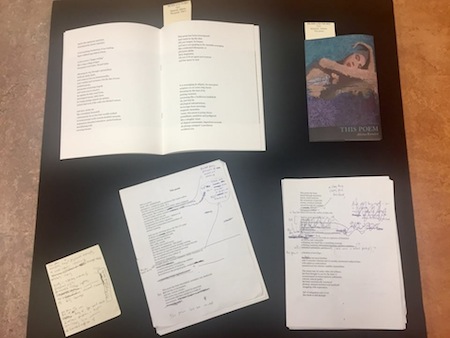Adeena Karasick has donated her archive to the Collection of Contemporary Literature at Simon Fraser University’s Bennett Library. (photo from Adeena Karasick)
Critically acclaimed poet and Vancouver native Adeena Karasick was in her hometown last month to celebrate the donation of her archive to Simon Fraser University.
The Collection of Contemporary Literature at SFU’s Bennett Library contains one of the biggest selections of avant-garde poetry in North America. “The collection has been building since 1965,” said Tony Power, the librarian-curator who oversaw the addition of Karasick’s works. “The collection features many of the poets whose tradition Karasick is associated with, such as Michael McClure and Robin Blaser. Karasick was influenced by her teacher, Warren Tallman, who also influenced, for example, Fred Wah, George Bowering and Daphne Marlatt. These are all poets who are featured in the Bennett Library collection.
“Karasick has a very high profile for a poet,” Powers added, “and a certain amount of notoriety for her more daring works.”
Karasick told the Jewish Independent that the Feb. 23 event, in which her personal notebooks became, in effect, public artifacts, was “surreal.”
“I was honoured to be included in this collection, one of the greatest collections in North America of contemporary poets and avant-garde renegades, provocateurs and risk-taking challengers of esthetics,” she said.
Karasick, whose work has been called “beautiful linguistic carnage” by Word Magazine, specializes in non-narrative, intimate works that are most concerned with the play of language itself.
“I am interested in using language to create different effects of meaning production, highlighting language as a physical, material, construct. Play, jouissance [delight], as Jew-essence,” she explained with a smile.
Karasick regularly plays with Jewish themes in her work, whether it’s the invocation of the Kotel (a wall made of words in more ways than one) at the heart of Dyssemia Sleaze, or the Hebrew letter mem, which inspires Mêmewars.
“In the kabbalah, the world is created through language,” she said. “That’s also the way I view things.”

Karasick’s speech is peppered with words like “intervention,” “transgression,” “disruption,” “nomadicism” and “vagrancy.” She aims, she explained, to “destabilize and subvert linguistic power structures with the hope of instigating new ways of seeing. My poetry uses playfulness and celebrates a sense of creative homelessness, a mashing up of poetry, critical theory and visuality.”
Asked how she felt about being a postmodern artist whose work has been called “an impressive deconstruction of language and meaning” by Canadian Literature, in an age where the American president, it could be said, was much maligned for engaging in similar activity, she pointed to Jewish postmodern philosopher Emanuel Levinas (1906-1995).
“I’m not saying there’s no truth. There is truth. There is what happened,” she said. “The search for the truth cannot be solitary or uniperspectival though, and cannot be an imposition of ‘the truth’ on others in a totalitarian way. Levinas said that truth itself arises out of discourse … it rests in the ethical relation between people, where a search for the truth can take place. Truth requires humility and multiplicity.”
Born in Winnipeg, Karasick’s family moved to Vancouver when she was six months old, and she grew up here. She had her bat mitzvah at Congregation Beth Israel and was very much a part of the local Jewish community. She went to the University of British Columbia for her undergraduate degree, did her master’s at York in Toronto and her doctorate at Concordia, in Montreal, in “French feminist post-structural theory and kabbalistic hermeneutics.”
Karasick now teaches at Pratt Institute in New York and is enjoying a growing distinction as one of the premier avant-garde poets of her generation. She is becoming known for her innovative use of video as well as the printed page.
In 2018, Karasick will release a new book, Alephville, a poem composed of faux Facebook updates. “I was un-nerved by the timing,” she said, referencing the administration of U.S. President Donald Trump, “by the fact that it is basically a poem composed of ‘alternative facts.’”
Also next year, Karasick will debut her “spoken-word opera” Salomé: Woman of Valour, a feminist reinterpretation of the biblical character. She co-wrote the piece with Grammy Award-winning musician Frank London of the Klezmatics. They met through KlezKanada, an annual klezmer camp that has been meeting in the Laurentians for 20 years, the poetry division of which Karasick has been director for the last six years.
Karasick wrote the libretto for Salomé: Woman of Valour and London composed the music, an original score that blends Arabic, klezmer, jazz and bhangra. The nomadic and subversive piece will première at next year’s Chutzpah! Festival.
Matthew Gindin is a freelance journalist, writer and lecturer. He writes regularly for the Forward and All That Is Interesting, and has been published in Religion Dispatches, Situate Magazine, Tikkun and elsewhere. He can be found on Medium and Twitter.

